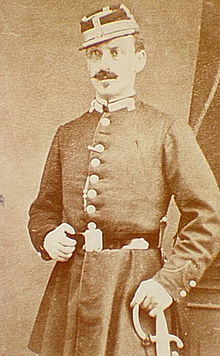Paul Antoine Brunel: Difference between revisions
Jellymanpro (talk | contribs) No edit summary |
NootyNooter (talk | contribs) m Don't mind me, just adding a few links. Tags: Visual edit Mobile edit Mobile web edit Newcomer task Newcomer task: links |
||
| Line 17: | Line 17: | ||
[[Category:French generals]] |
[[Category:French generals]] |
||
[[Category:French socialists]] |
[[Category:French socialists]] |
||
On January 26, 1871, upon the announcement of the [[armistice]] with the Germans, he attempted to seize the forts in eastern Paris; he was arrested and sentenced to prison. He was released on February 26 by the [[National Guard (France)|National Guard.]] On March 18, 1871, at the start of the Parisian uprising against the government of [[Adolphe Thiers]], he captured the Prince-Eugène barracks. On March 24, 1871, he led the attack against the town hall of the 1st arrondissement of Paris, in the company of Maxime Lisbonne and Eugène Protot. The same day, he was named general of the Commune (with Émile Eudes and Émile-Victor Duval). The 7th arrondissement elected him to the [[Municipal council (France)|Municipal Council]]. He then requested his release as a general. He was responsible for the difficult reorganization of the defense of [[Fort d'Issy|Fort Issy]]. He was seriously wounded in combat during Bloody Week, but managed to take refuge in England. He remained there and became a professor at the Dartmouth Naval School. |
On January 26, 1871, upon the announcement of the [[armistice]] with the Germans, he attempted to seize the forts in eastern Paris; he was arrested and sentenced to prison. He was released on February 26 by the [[National Guard (France)|National Guard.]] On March 18, 1871, at the start of the Parisian uprising against the government of [[Adolphe Thiers]], he captured the Prince-Eugène barracks. On March 24, 1871, he led the attack against the town hall of the 1st arrondissement of Paris, in the company of Maxime Lisbonne and [[Eugène Protot]]. The same day, he was named general of the Commune (with Émile Eudes and Émile-Victor Duval). The 7th arrondissement elected him to the [[Municipal council (France)|Municipal Council]]. He then requested his release as a general. He was responsible for the difficult reorganization of the defense of [[Fort d'Issy|Fort Issy]]. He was seriously wounded in combat during Bloody Week, but managed to take refuge in [[England]]. He remained there and became a professor at the Dartmouth Naval School. |
||
{{France-mil-bio-stub}} |
{{France-mil-bio-stub}} |
||
Revision as of 23:41, 13 February 2024
This article has multiple issues. Please help improve it or discuss these issues on the talk page. (Learn how and when to remove these template messages)
|

Paul-Antoine Brunel (12 March 1830 – 1904) was a French general. He was a French lieutenant who became a leader of the Paris Commune during the Siege of Paris in 1870. He broke into Paris through the Prussian siege.
Biography
As the second lieutenant in the 4th Hunter regiment, he resigned from the Imperial army in July 1864. During the siege of Paris by the Germans (September 1870-March 1871) he took part in the Blanquist uprising of October 31, 1870, against the government of National Defence. On January 26, 1871, upon the announcement of the armistice with the Germans, he attempted to seize the forts in eastern Paris; he was arrested and sentenced to prison. He was released on February 26 by the National Guard. On March 18, 1871, at the start of the Parisian uprising against the government of Adolphe Thiers, he captured the Prince-Eugène barracks. On March 24, 1871, he led the attack against the town hall of the 1st arrondissement of Paris, in the company of Maxime Lisbonne and Eugène Protot. The same day, he was named general of the Commune (with Émile Eudes and Émile-Victor Duval). The 7th arrondissement elected him to the Municipal Council. He then requested his release as a general. He was responsible for the difficult reorganization of the defense of Fort Issy. He was seriously wounded in combat during Bloody Week, but managed to take refuge in England. He remained there and became a professor at the Dartmouth Naval School.
